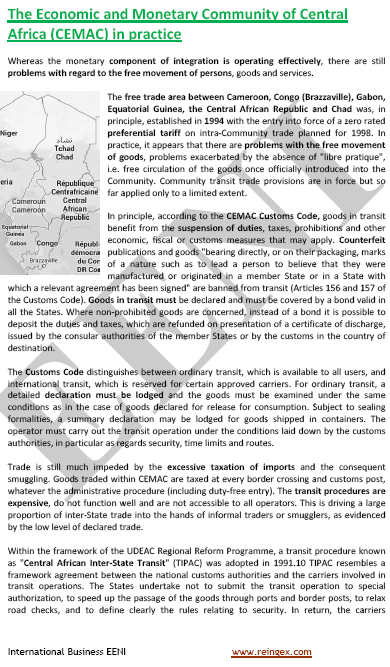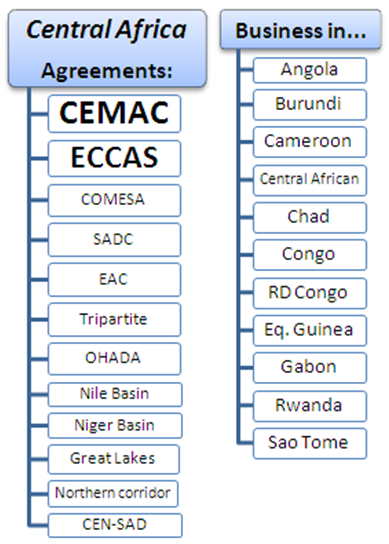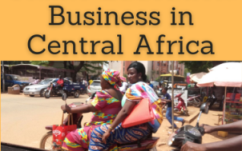Central African Economic Area, Angola
Module: Cameroon, Congo, Guinea, Chad (Central African Economic Area)
The Central African Economic Area consists of eleven countries: Angola, Burundi, Cameroon, the Central African Republic, Chad, Equatorial Guinea, Gabon, the Republic of the Congo, the Democratic Republic of the Congo, Rwanda, and São Tomé and Príncipe.
- French is the main language in Central Africa
- The largest Central African economy is Angola
- The Democratic Republic of the Congo and Cameroon are also two important regional players


- Introduction to the Central African Economic Area of African Civilization
- Christianity in Central African Economic Area
- Economic Profile of the Central African Countries
- Businesspeople in Central African Economic Area
- Interactions of the Central African Economic Area with other African Economic Areas (West Africa, Southern Africa, East Africa, and Maghrebian)
- Interactions of the Central African Economic Area with other economic areas
- Logistics in Central Africa
- Economic Organizations related to Central African Economic Area
Sample:
The goals of the module “Central African Economic Area” are the following:
- To define the economic characteristics of Central African Economic Area
- To learn about economic profile of Central African Countries
- To understand the influence of Christianity and African Traditional Religions on Central African Economic Area
- To understand the economic integration process in Central African Economic Area
- To analyze the main Businesspeople in Central Africa
- To explore the economic relationships with other economic areas
- To analyze the main Economic Organizations related to Central African Economic Area

Module “Central African Economic Area” is included within the curriculum of the following academic programs at EENI Global Business School:
Doctorate in African Business, Ethics, Religions & Business, World Trade.
Master in Business in Africa, International Business.

Masters adapted to the Central African Students:  Cameroon and
Cameroon and  Rwanda.
Rwanda.
Why study “Christianity and Business”?.
Languages:  or
or  Afrique Centrale
Afrique Centrale  África Central
África Central  África Central.
África Central.
Download the syllabus “Central African Economic Area” (PDF).
- Credits of the Module “Central African Economic Area”: 1



Central African Economic Area.
- Portuguese is spoken in Angola and São Tomé and Spanish in Equatorial Guinea
- One should also take into account the hundreds of Central African languages
- From the economic integration, Burundi and Rwanda also belongs to East African Economic Area
- Main religion in Central Africa: Christianity
- 44% of the Chadian population is Muslim
- The largest ports in Central Africa are the Port of Duala, Port of Libreville, Port of Luanda and Lobito, Port of Pointe Noire, and Port of Malabo
- Trans-African corridors across Central Africa: Lobito Logistics Corridor, Beira-Lobito Corridor, Northern Logistics Corridor, Tripoli-Windhoek Logistics Corridor, Central Logistics Corridor, North-South Logistics Corridor, N’Djamena-Djibouti Logistics Corridor, Trans-Sahelian Highway, and Lagos-Mombasa Logistics Corridor
Personalities and businesswomen of Central Africa: Théophile Obenga, Elikia M'Bokolo, Isabel dos Santos, and Amini Kajunju.
There are three important economic integration processes in Central Africa:

- Cameroon, the Republic of the Congo, Gabon, Equatorial Guinea, the Central African Republic, and Chad are members of the Central African Economic and Monetary Community (CEMAC) (fully operational)
- Angola, Burundi, Cameroon, Chad, the Central African Republic, Congo, the DR Congo, Gabon, Equatorial Guinea, and São Tomé and Príncipe are members of the Economic Community of Central African States (ECCAS)
- Burundi, the DR Congo, and Rwanda are members of the Common Market for Eastern and Southern Africa (COMESA) and therefore of COMESA-EAC-SADC Agreement
- Angola and the DR Congo are members of the Southern African Development Community (SADC)
- Rwanda and Burundi are members of the East African Community (EAC)
- Cameroon, the Republic of the Congo, Chad, Gabon, Equatorial Guinea, the Central African Republic, and the DR Congo are members of the Harmonization of Business Law in Africa (OHADA)


Other trade agreements and economic institutions in Central Africa.
- Burundi, the DR Congo, and Rwanda are part of the Economic Community of the Great Lakes Region
- Angola, Burundi, the Central African Republic, the Republic of the Congo, the DR Congo, and Rwanda are members of the Conference on the Great Lakes
- Burundi, the DR Congo, and Rwanda are members of the Nile Basin Initiative
- The Central African Republic and Chad are part of the Community of Sahel-Saharan States (CEN-SAD)
- Cameroon and Chad are members of the Niger Basin Authority
Interactions of the Central African Economic Area with other civilizations.
Angola, Chad, the DR Congo, Rwanda, Equatorial Guinea, São Tomé, Burundi, and the Central African Republic are beneficiaries of SPG of EU and the Africa-EU Partnership of the European Union.
All Central African Countries are beneficiaries of the AGOA (U.S.).
Trade Preferential System (OIC-TPS).
- No country in Central Africa has signed the Framework Agreement + PRETAS (Protocol on the Preferential Tariff Scheme) + Rules of origin
- Chad and Gabon only have signed the Framework Agreement
All Central African Countries are members of the African Development Bank, AUDA-NEPAD, African Union, and the Economic Commission for Africa (CEA).
Sample:
(c) EENI Global Business School (1995-2025)
Top of this page









 WhatsApp
WhatsApp
